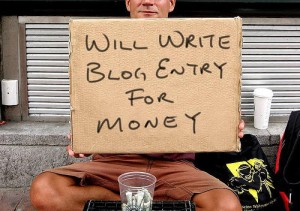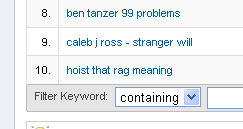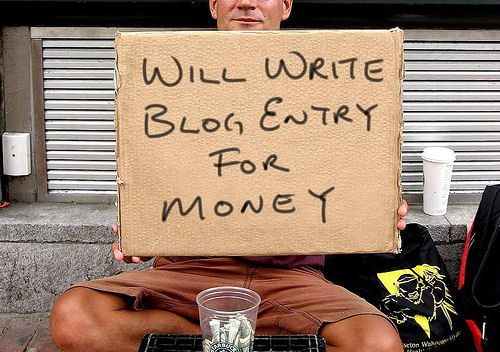Click here to read the guest post. Also, don’t forget that if you comment on all guest blog posts, you will get free stuff. About the Stranger Will Tour for Strange: My goal is to post at a different blog every few days beginning with the release of his novel Stranger Will in March 2011 to the release of my second novel, I Didn’t Mean to Be Kevin in November 2011. If you have connections to a lit blog of any type, professional journal or personal site, please contact me. I would love to compromise your integrity for a day. To be a groupie and follow this tour, subscribe to the Caleb J Ross blog RSS feed. Follow me on Twitter: @calebjross.com. Friend me on Facebook: Facebook.com/rosscaleb See all tour stops here
Category Archives SEO for Authors
Authors need to know how to optimize their web presence for search engines. SEO for Authors aims to do just that. Why do authors need to know about search engine optimization? So that when readers are using a search engine to find information related to an author’s work, the author’s website, social profiles, Amazon author page, Wikipedia page, and others have the best possible chance of appearing.
Recently, I was kindly invited to participate in a panel on social media during the 2011 AWP (Association of Writers and Writing Programs) conference in Washington DC. Joined by Tanya Egan Gibson, Dan Blank, Bethanne Patrick, Christina Katz, and moderator Jane Friedman, the panel succeeded in opening up and emphasizing both the possibilities and importance of social media in developing an author’s platform. Having never before participated in an AWP panel (though I have attended many), I was initiated only from the perspective of an audience member. Knowing that an uninteresting topic coupled with boring presenters may drive the audience to mutiny, I came prepared to be as concise and witty (hopefully) as possible. Overall, I consider my effort a success. Of course, having the aforementioned panelists at the dais made failure near-impossible. I’ve argued before that and author should openly embrace social media; the goal of both online social…
During a recent discussion on NPR, Heather Fain, marketing director for the publisher Little, Brown and Co. said that “the greatest marketing tool we have in publishing — and probably will never change — is word of mouth.” This means not only literal friend-to-friend and bookseller-to-buyer hand selling, but also online forums, reviews, blog comments, and social network discussion. For the most part, authors have little control over this. One aspect authors can control: the old fashioned website. Optimizing a website so that it can be more easily found by readers is to most authors, I would assume, a foreign concept. Not that I am discrediting authors; I simply hope that most of you aren’t as nerdy as I am. Having a platform (re: a stable of willing buyers) is becoming more and more important to publishers. Optimizing your web presence is an important way to grow that platform. Many…
 Disclaimer: I am far from a career author. I’ve made enough money to buy a few fifths of whisky and some diapers for my baby, so needless to say I’ve got a long way to go. The following plan reflects this outsider (re: possibly ignorant) perspective.
The idealized author spends his time alone, churning out typewritten manuscripts to meet constant deadlines. He drinks. Probably smokes. He’s respected. He vacations in tropical seclusion, but still, even with the changed view, he writes. He has no day job. He is an author. Writing puts his kids through college.
There is a reason this image contains a typewriter. Much like the machine itself, the idealized author is all but extinct. I think a lot of writers would like to go back to this model. Is it possible to not just retain the author career, but to make it thrive?
Given the following set of assumptions, I believe it would be possible to bring back the author career:
Disclaimer: I am far from a career author. I’ve made enough money to buy a few fifths of whisky and some diapers for my baby, so needless to say I’ve got a long way to go. The following plan reflects this outsider (re: possibly ignorant) perspective.
The idealized author spends his time alone, churning out typewritten manuscripts to meet constant deadlines. He drinks. Probably smokes. He’s respected. He vacations in tropical seclusion, but still, even with the changed view, he writes. He has no day job. He is an author. Writing puts his kids through college.
There is a reason this image contains a typewriter. Much like the machine itself, the idealized author is all but extinct. I think a lot of writers would like to go back to this model. Is it possible to not just retain the author career, but to make it thrive?
Given the following set of assumptions, I believe it would be possible to bring back the author career:
- Content will continue to outweigh consumption
- The marketplace is spoilt by free content, and much of that content will continue to be free
- eBooks/eReaders will be a primary content medium within the next decade
- The cost to produce and distribute market-quality products will continue to fall
- Consolidate the agent and publisher roles. Basically, this combined entity should act as a time and beaurocracy manager for authors. Today, authors have the ability to publish and distribute their own content without the help of agents and publishers. If this Pub/Agent composite can give authors time to write, then they will ultimately be given the sort of consistent product that the marketplace loves. Marketing thrives on trends. Giving authors time is the way to nurture trends.
- Increase author royalties. As media becomes electronic, the savings on overhead and distribution must be passed on. Court your talent, publishers. I’ve read the arguments against electronic media being cost-savers for publishers, and I just don’t believe them.
- Embrace the eBook paradigm shift. As a reader, I haven’t yet fallen in love with eBooks. As a writer, I am very excited by the possibilities. Instead of fighting to keep print alive, fight to make eBooks thrive. eBooks have the potential to increase the pool of readers, much as the iPod did for music enthusiasts.
- Brand yourselves as independent records labels do. Make fans out of your press, not just out of your authors. I won’t go into much depth here about this, but we do have an episode forthcoming at the Welcome to The Velvet podcast on this topic.
- Provide consistent and brandable content. As Dan Holloway says in the comments at Jane Smith’s How Publishing Really Works blog, “If you are writing for the art, by all means try your hand at getting an agent, but don’t be upset if you don’t get one – and if the feedback is that you should be more commercial in order to get one, then make the decision – do you want to write for the pay packet, or do you REALLY want to do it for the art? And if it’s the latter, don’t expect to be picked up, or blame the publishers when you aren’t.”
- Prove that you can provide that content. As Jane Smith says in a response to the above comment, “I think that a big reason that most writers make such a paltry amount is that there are lots of people out there who call themselves writers but who only really dabble with writing: they sell an article every now and then, take several years to write just one book; sure, they’re writers–but not full-time, serious writers.”. A career author must write as though it is a career.



